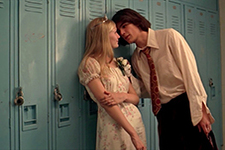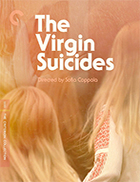The Virgin Suicides (4K UHD)
|  Sofia Coppola’s remarkable directorial debut, The Virgin Suicides, is a hazy, dream-like tale of how the local teenage boys of a wealthy Michigan suburb in the early 1970s view the Lisbon sisters. These five daughters of the gawky high school math teacher (James Woods) and his sternly religious wife (Kathleen Turner) are all blond and beautiful, ranging in age from 13 to 17, and they are the subject of many private fantasies. A group of teenage boys watch them from across the street, talk about them, and save any and all souvenirs that might give them some insight into their otherwise opaque world. Although the five Lisbon sisters are arguably “the main characters,” this is not the story of who they were, but rather the story of how they were perceived. This is driven home by the fact that the narration (read by Giovanni Ribisi) is a collective remembrance, using the inclusive pronoun “we.” The narrator is not one boy who grew up and looks back on the past with longing and a still-incomplete sense of understanding about what happened; rather, he is all the boys who share in the same feelings. Those feelings about the Lisbon sisters are often realized visually with near-kitschy moments of soft-focus fantasy in which the girls are seen in slow motion and extreme close-up, lit with setting sunlight in golden fields. Once again, while these moments border on parody, we realize they are not because this is how adolescent boys whose heads are filled with movie images and rock ballads about lost love would see them: as unreachable fantasy figures. As the title of the film makes clear, the Lisbon sisters—Lux (Kirsten Dunst), Bonnie (Chelse Swain), Mary (A.J. Cook), Therese (Leslie Hayman), and Cecilia (Hanna Hall)—will have killed themselves by the end. Why do these five girls kill themselves? What drives to them to such despair and unhappiness that they would end their own lives? The film presents a potential answer: the fact that their repressive Catholic mother becomes so fearful of their budding sexuality that she literally locks them up in the house and does not allow them to go out, thus killing their desire to live. Yet, this answer is so obviously trite and simplistic that it has to been seen as a screen. It is too easy, and the film is too smart to wrap up its story in such pat fashion. No, there is something more mysterious about the deaths of the five Lisbon sisters, and the reasons behind their suicides will never be answered. After all, how can anyone possibly trace the full explanation of what drives someone to end her own life? To suggest that such an extreme action can be boiled down to simple cause-and-effect reasoning is to wrongfully simplify the whole of human existence. Much of the film is laced with a strong awareness of the Lisbon sisters’ emergent sexuality, especially Lux, who is the most ambitious of the five. Like the various “sex kitten” characters played over the years by Brigitte Bardot or the eponymous Lolita in Stanley Kubrick’s coyly provocative 1962 comedy, Lux is almost overly erotic because everything about her is so ambiguous; every swish of her shoulder, every bat of her eye, every curl of her toes could be either harmless, unknowing, girlish flirtation or provocative, womanly seduction. When the story takes a long detour to tell how Lux becomes involved with Trip Fontaine (Josh Harnett), a high school stud who recently emerged from puberty to the delight of all the girls at school, the film becomes a compelling evocation of growing adolescent sexuality and the pangs and longing of true first love. Because the sisters seem doomed from the opening frames—the sunny smiles and happy demeanors that characterize their introduction into the narrative have a tragic, somewhat sinister edge that that always accompanies characters who are going to die, but do not know it yet—the movement toward their eventual suicides does not feel like conventional narrative movement, but rather a slow and steady descent into the inevitable. The Virgin Suicides was adapted from a talked-about first novel by Jeffrey Eugenides, and Sofia Coppola’s challenge was to capture the tone of the story—the unique sense of mystery and the longing the defines adolescence. She does this quite successfully, aided in no small part by cinematographer Edward Lachman’s soft, filtered cinematography that gives the film the sensation of a dream or memory, while also evoking the specific look of the early 1970s without descending into kitsch. The costumes by Nancy Steiner and set designs by Megan Less are all first-rate, bringing out just enough of that time period to set the tone without being overwhelming. Coppola makes magnificently effective use of period music by ’70s pop bands like Styx and Heart; rather than using obvious romantic ballads as an ironic counterpoint, she uses them in a completely straight fashion that somehow works. Coppola was clearly aiming to make to make an unconventional film about adolescence, and she succeeded admirably. Some of her more daring moments of visual flair, such as allowing the camera to have X-ray vision so that we may see that Lux has written Trip’s name on her underwear, are hit-and-miss. Sometimes they add to the mood, sometimes they distract. Yet, even when the film doesn’t quite work, it still adds up to an impressive feat, especially for a first-time feature director who was still in her late 20s (albeit one who grew up in the industry as the daughter of filmmaker Francis Ford Coppola). Throughout the film Sofia Coppola demonstrates a unique visual style and strong sense of personal artistry that would come to define her subsequent output as a filmmaker: Lost in Translation (2003), which remains her masterpiece; Marie Antoinette (2005), her unconventional take on the teenage French queen; and the evocative psychodrama The Beguiled (2017), among others. While some of her output has been uneven over the years, the singularity of her artistry is always in evidence, an artistry that emerged almost fully formed in The Virgin Suicides, which makes the film all the richer and more powerful.
Copyright © 2022 James Kendrick Thoughts? E-mail James Kendrick All images copyright © The Criterion Collection | |||||||||||||||||||||||||||||
Overall Rating: 


 (3.5)
(3.5)


